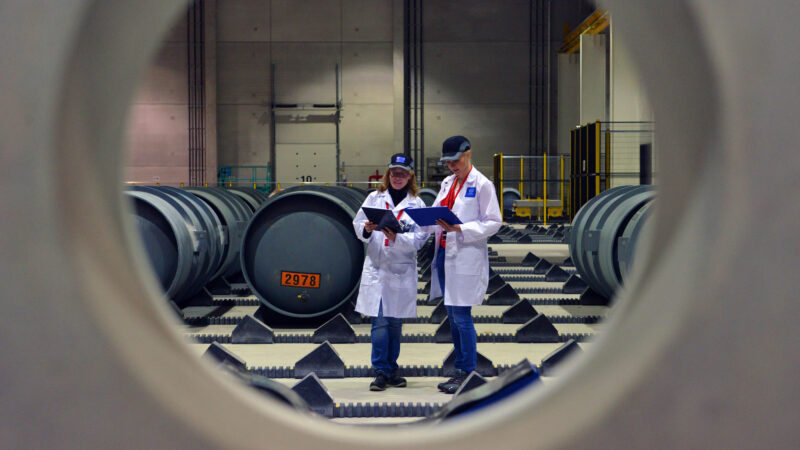The lack of a Brexit plan: perfect to win a referendum, a nightmare now – the Euratom issue

So Tory backbenchers are rebelling about Euratom (the European Atomic Energy Community). They want to stay in it, despite Brexit, according to The Evening Standard. And enough want to stay in it so as to deny Theresa May a majority, apparently.
Dominic Cummings, the supposed brain behind Vote Leave goes even further on Twitter:
https://twitter.com/odysseanproject/status/884354037956718593
A bit rich that, coming from one of the main architects of Vote Leave.
You might have thought that Vote Leave would have had a plan for whether to stay in Euratom or not. But no, it seems they did not. There was not even a single mention of Euratom on the Vote Leave website (or at least there isn’t on the archive of the Vote Leave site, because Vote Leave itself deleted its website to stop pesky people like me trying to find out what they didn’t say, so we have to rely on the archive).
The EU side has a paper about Euratom in the Brexit negotiations (PDF here), but that does not help us much on the implications for the UK – it is about what happens to the EU’s liabilities if the UK leaves.
The problem is that no-one knows how to stay in Euratom as a non-EU Member State as no state has ever done it. There is even less precedent here then in market issues where Iceland or Norway can be models. The only precedent for Euratom is Switzerland that is an associate state – that would be a route open to the UK as well, only no one has any idea whether that is what the UK is actually pursuing. A search of gov.uk for Euratom only digs up a few relevant speeches by Davis, Fox and Jones, and the Brexit White Paper, that mention Euratom.
The words of David Davis on 31 January 2017 in his Opening statement on Second Reading of EU (Notification of Withdrawal) Bill are the most informative (emphasis mine):
I would like to draw Hon. Members’ attention to the Explanatory Notes of the Bill, which set out the application of the Bill to Euratom. The Bill also gives the Prime Minister the power to start the process to leave Euratom.
The Bill also makes clear that in invoking Article 50, we will be leaving Euratom, the agency established by treaty to ensure cooperation on nuclear matters, as well as leaving the European Union. This is because, although Euratom was established in a treaty separate to European Union agreements and treaties, it uses the same institutions as the European Union including the Court of Justice. That is why the 2008 EU Amendment Act makes clear that, in UK law, membership of the European Union includes Euratom. And it is why Article 50 applies to both the European Union and Euratom.
Our aims are clear — we will maintain the closest possible nuclear cooperation with the European Union. That relationship could take a number of different forms and will be of course subject to negotiation, which will start after we have notified.
What does “closest possible” actually mean? Closest possible while the European Court of Justice has no jurisdiction? i.e. the option the Swiss have has been ruled out? Of course Vote Leave also gave us no clarity on the European Court of Justice question before the referendum – they slam the ECJ (here for example), but do not categorically rule it out (full Vote Leave archive search here).
And if the UK did want to not leave Euratom at all… well, it might be too late to even contemplate that, as leaving it was part of the Article 50 notification (as David Allen Green alludes to here).
So here we are once again. More than a year on from the referendum Britain has no idea what it is doing. Its hospitals may not be able to get the nuclear material they need once Brexit happens, but there was no plan for how to cope with that before the referendum, and no-one has made a solid plan for it in the 12 months since either. If there had been a plan for these sorts of matters prior to 23 June 2016, that plan would have been examined and critiqued in the referendum campaign, and the case for Brexit would have been harder.
Keeping everything at the level of vague soundbites was good enough to win Cummings and co the referendum, but as his tweet now shows, the way they fought the referendum then leaves the UK in an almighty mess now, as no questions about the detail of Brexit were adequately answered.
[UPDATE 10.7.2017, 1545]
So it seems the UK government is considering the Swiss option – vaguely alluded to in The Guardian here. But that brings the ECJ back into play even if, as Steve Peers says, the ECJ seldom adjudicates on Euratom issues. Still, seldom is very different to being out of the jurisdiction of the ECJ altogether… UK Government’s red line on the ECJ cracking before our eyes?
[UPDATE 10.7.2017, 1615]
Catherine C (@PH_AdvocateEU) points me to this excellent explainer of why Euratom (and radioactive isotopes) – and their time critical delivery – are so important in cancer treatment.